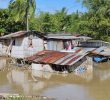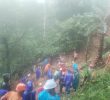DAVAO CITY, Philippines – Various groups slammed the lifting of the nine-year moratorium on new mining agreements through Executive Order No. 130 that President Rodrigo Duterte signed on April 14, 2021.
Duterte signed the order to aid the country’s ailing economy due to the impact of the pandemic that closed businesses and resulted to loss of millions of jobs.
The alliance of Bangsamoro and indigenous people’s organization SANDUGO debunked it as a response to the crisis but a scheming opportunity for the sellout of their ancestral domain.
“The state has played a vital part in harassing and intimidating various ethnolinguistic groups that seek to protect their ancestral lands. We have seen over decades how this has led to the enforced exodus of many tribes,” the groups said.
They said that the military deployment and operations have been used to protect mining exploration and operations citing the involvement of Mr. Dan Balandra, a security consultant to Sagittarius Mining, Inc. (SMI)-XStrata-Copper and the alleged involvement of Col. Alexis Bravo and members of the 27th IB in the massacre of Datu Daguil Capion’s family in 2012.
Datu Daguil together with some members of the B’laan tribe waged a ‘’pangayaw,’’ a traditional declaration of war against enemies of a tribe, to the intrusion of the SMI-Xstrata into their ancestral lands.
The groups said both the AFP and the mayor worked to undermine the ‘’pangayaw’’ and declared Datu Daguil a bandit and placed a bounty of P300,000 on his head for his capture – dead or alive.
EO No. 130 reverses a portion of Executive Order 79 which prohibits the granting of mineral agreements until a new legislation rationalizes the existing revenue sharing schemes and mechanisms shall have taken effect.
The order cited that the Tax Reform Acceleration and Inclusion has doubled the rate of excise tax on minerals, mineral products and quarry resources from 2 percent to 4 percent and that the country has only tapped less than 5 percent of its mineral resources.
“In addition to ushering significant economic benefits to the country, the mining industry can support various government projects, such as the ‘Build, Build, Build’ program to provide raw materials for the construction and development of other industries; and the ‘Balik Probinsya, Bagong Pag-asa’ program to increase employment opportunities in remote areas where there are mining activities thereby stimulating countryside development,” the EO 130 reads.
However, former Philippine Misereor Partnership Incorporated (PMPI) in a statement revealed that the mining sector has yet to surpass the 2 percent share to the country’s total revenue based on a 2013-2018 data by the treasury.gov.ph about the percentage share of Philippine Mining Sector to Philippine Export, and Government Revenue from Taxes, Fees and Royalties in millions of pesos.
The network of faith-based groups, NGOs and people’s organizations said that the Philippine Mining Industry is an export-oriented industry geared toward serving the needs of foreign countries for raw and semi-processed minerals.
They cited that the poverty incidence in host mining provinces is high as reflected in the 2015 regional Annual Per Capita Poverty Threshold among prominent mining regions like MIMAROPA, CARAGA, Region IX Zamboanga Peninsula (ZAMPEN), Region XII SOCCSKSARGEN, and Region V Bicol in relation to the national Annual Per Capita Poverty Threshold.
“Our communities are witnesses to this. Among those that suffer the most from irresponsible large-scale mining corporations are communities of Marinduque, Rapu-rapu Island in Albay, and Manicani Island of Eastern Samar. These communities up to this moment bear witness to the scars and poison of open-pit mining – Marcopper Mining Tragedy of 1996 that poisoned the Boac River and the communities living within the area; the un-rehabilitated mine site of Manicani Island despite Hinatuan Mining Corporations’ expired mining contract and worse, the Mines and Geosciences Bureau (MGB) and the DENR approved its mining contract in the past without Final Mine Rehabilitation and Decommissioning Plan per mandated by law,” the group added.
PANALIPDAN co-chairperson Dr. Jean Lindo viewed the lifting as an environmental Trojan horse which is both ‘’ecocidal’’ and ethnocidal given as a gift on the upcoming Earth Day.
“Now I am beginning to understand what “resource curse” means. While resource scarce countries have demonstrated economic advancement that puts people in the equation of development, we are going in a direction incompatible with sustainable and inclusive development,” Dr. Lindo said.
Meanwhile, the MGB Davao region welcomed EO No. 130 as it awaits for the implementation issuance.
According to the mining bureau, 19 applications for Mineral Production Sharing Agreement (MPSA) were affected at the time of the implementation of EO No. 79, two of which were converted to Applications for Exploration Permit (EP) in Region XI.
In its presser, the region has 17 applications for MPSA, of which 12 were previously endorsed to MGB Central Office for final evaluation but were returned due to the moratorium.
MGB Davao region identified Apex Mining Co., Inc. (AMCI) in Davao de Oro and Holcim Mining Development Corporation (HMDC) in Davao City as the only two large scale mines operating in the region.
In July 2016, the late DENR Secretary Regina Lopez following the industry-wide audit on 41 large-scale mines in the country closed 23 metallic mines while five others were suspended due to “serious environmental violations.”
mining









